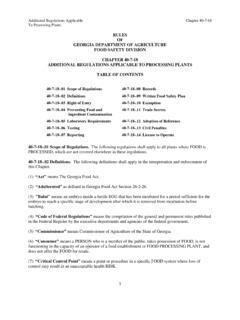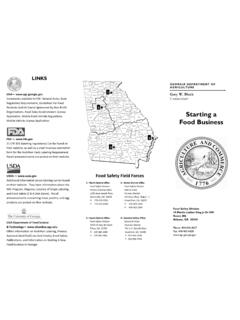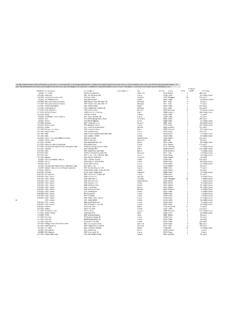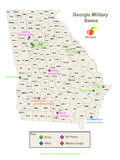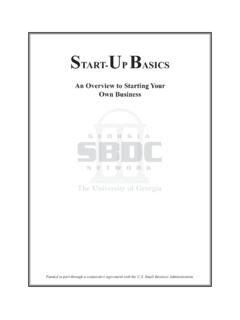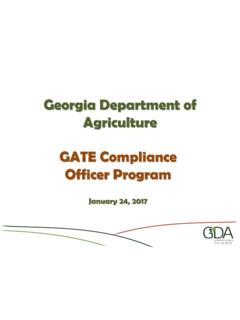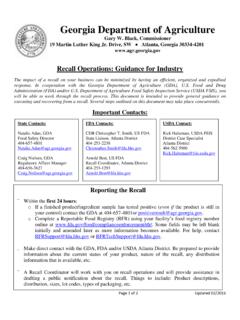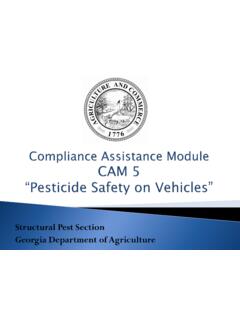Transcription of Georgia Department of Agriculture Food Safety Division
1 Cottage Foods: FAQ Page 1 of 5 9/26/2012 Georgia Department of Agriculture food Safety Division Is there a limit to how much I can sell as a Cottage food producer? The Georgia Department of Agriculture does not have any limits on gross sales or the number of units that can be produced. What types of Cottage Foods can I produce in my home? Non-potentially hazardous foods that do not require time and/or temperature control for Safety (can be safely kept at room temperature and do not require refrigeration). Specific products are listed in the guidance document. What are Potentially Hazardous Foods A producer of Potentially Hazardous food does not qualify as a Cottage food Operator. "Potentially Hazardous food " is defined in the Cottage food Regulations in (16) and is used to classify foods that require time-temperature control (cannot be safely kept at room temperature; and therefore require refrigeration) to keep them safe for human consumption.
2 Examples of Potentially Hazardous Foods are as follows: Meat (beef, pork, lamb); Poultry (chicken, turkey, duck); Fish; Shellfish and crustaceans; Eggs; Milk and dairy products; Cooked, plant-based foods ( , cooked rice, beans, or vegetables); Baked potatoes; Certain synthetic ingredients; Mushrooms; Raw sprouts; Tofu and soy-protein foods; and Untreated garlic and oil mixtures. Will I need to meet local zoning or other laws? Yes. Cottage food Operators should contact their local city and county governments to determine if there are local regulations or ordinances that will prevent operation of a home-based business. Can I utilize commercial type equipment such as large rotary mixers in my cottage food operation? No. Typically a private home is not equipped with sinks required to effectively wash, rinse, and sanitize large commercial equipment.
3 Does my equipment, stove and/or refrigerator need to be NSF (a food equipment evaluation group) approved? No. As a Cottage food operator, you are not required to meet NSF standards for the equipment used to manufacture Cottage food products. Do I need to have a DBA for the Cottage food law? A DBA (Doing Business As) may be a requirement of your county or local municipality. The farmers market where I want to sell my products says I need a food Sales Establishment License, even though I have obtained a Cottage food License from the Georgia Department of Agriculture . Can the market require a license? Yes. Even though an entity may be licensed as a Cottage food Operation, some farmers markets or other direct marketing venues may require vendors to have a food Sales Establishment License.
4 Local policies enacted by farmers market boards and other local governing bodies are outside the scope of the Department s Cottage food Regulations. Are there any special requirements regarding my home on-site well? Yes. Only potable water from a properly constructed on-site well or municipal water system can be used. If a well is used, the well water should be tested, at least annually, for coliform bacteria and nitrates. Water from wells with any of the following features should be avoided: Very shallow depth (< 25 ft); Producing cloudy water; Located in below-ground pit; Buried wellhead; Cottage Foods: FAQ Page 2 of 5 9/26/2012 Missing cap or seal; Opening around casing pipe; Located in close proximity to septic system ; or Dug well. Local county health departments can provide consultation on drinking water quality and well construction.
5 Are there any concerns related to my home on-site wastewater (septic) system? Depending on the nature and volume of the food products which will be manufactured for sale, there can be adverse effects to the existing system serving the home. For instance, adding significant bakery wastewater can not only increase the total volume discharged but may also result in the increase in the organic strength of the wastewater discharged to the drain field, leading to the possibility of accelerated system failure. The adequacy of the home system to handle additional wastewater loading should be evaluated by the local county health Department prior to initiating manufacturing. The local county health Department can advise you if modifications to the existing system may be necessary. Why are some products not allowed to be made and sold under the Cottage food Law?
6 The Cottage food Regulations allow food entrepreneurs to operate small food businesses and produce a variety of food products that are generally considered to be low-risk from a food Safety standpoint, if prepared properly in an unlicensed and uninspected kitchen, while protecting public health to the greatest extent possible. The allowable products list is based on the food Safety risk level associated with certain types of food . People who operate licensed and routinely inspected food processing businesses have to meet certain requirements for training, food Safety and handling, and product testing. Since Cottage food businesses are uninspected, it is necessary to limit food products allowed under the law to those that are considered low risk, or non-potentially hazardous. Are pet treats included under the Cottage food Law?
7 No. The Cottage food guidance document applies to human grade food only. Can I produce and sell cooked vegetable products, like salsas, tomato sauces, spaghetti sauces, or foccacia bread with roasted vegetables? No. food products made with cooked vegetable products do not qualify under the Cottage food Regulations. Manufacturers of cooked vegetable products like salsas and tomato sauces must meet significant federal and state training and licensing requirements. Cooked vegetables, whether fresh or canned, usually are made from a combination of low acid and acidified foods, and are considered a Potentially Hazardous food . Cooked vegetables must be held either hot (above 135 F) or cold (below 41 F). They can't be stored at room temperature, which makes them ineligible for production in a cottage food operation.
8 Can I bake bread in a wood fired oven under the Cottage food Regulations? Yes, as long as that oven is in your home kitchen. Can I make and sell apple butter, pumpkin butter or other fruit butters? No. Fruit butters have significantly less sugar than a traditional jam or jelly. It is the combination of acid, sugar, pectin and heat that assures the Safety of jams and jellies. In fruit butters, the combination of sugar and pectin is not large enough to assure that the butter is safe. Additionally, with lower sugar and pectin levels, spoilage organisms are more likely to survive the cooking process, which would allow for a micro-environment to develop and allow for the growth of Clostridium botulinum. Can I press and sell apple cider under the Cottage food Regulations? No. Apple cider is not a food allowed to be produced.
9 No beverages are allowed to be produced under the Cottage food Regulations. Are honey and syrup covered under the Cottage food Regulations? No. Honey and syrup are not considered cottage foods, because state regulatory requirements and exemptions typically have some significant differences. Please contact the food Safety Division for more information. Can I make and sell dehydrated meats under the Cottage food Regulations? No. Meats are a Potentially Hazardous food and are not allowed under the Cottage food Regulations. I lease space in a retail building where I operate a small antique shop. As a Cottage food Operator, can I sell my own baked goods from my shop under the Cottage food Regulations? Yes, as long as they are labeled correctly and completely, and the label includes any allergens the product may contain.
10 However, you can't sell other people's products ( , consignment) nor have other people sell your products ( , wholesalers). Can I make and sell hard candies or lollipops under the Cottage food Regulations? Yes. Hard candies, lollipops and peppermint candies are allowed under the Cottage food Regulations, as long as they are packaged and sold in a way that the required labeling information is conspicuously displayed for the consumer. Can I make and sell sweet breads, muffins or other baked goods made with fresh fruits and vegetables like zucchini, pumpkin, and strawberries? Yes, as long as the fruits or vegetables are incorporated into the batter and properly baked, labeled and packaged. The baked goods may not be decorated or garnished with fresh fruits or vegetables. Cottage Foods: FAQ Page 3 of 5 9/26/2012 Can I use homegrown fruits and vegetables in baked goods?
